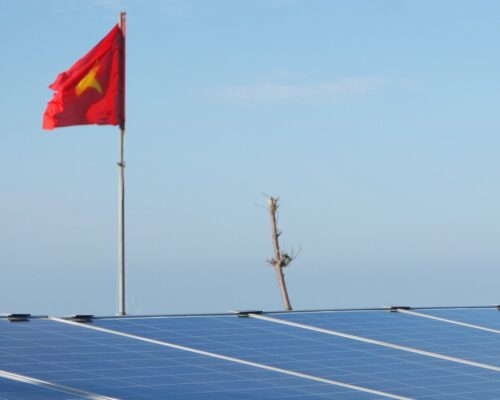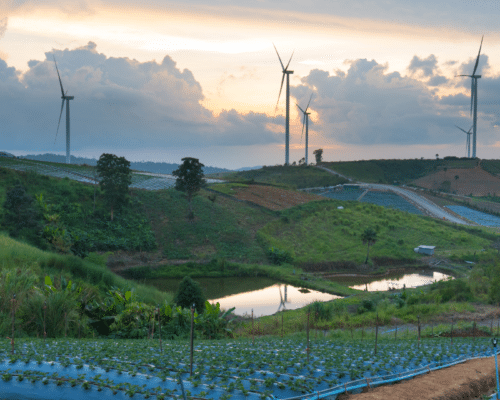Japanese Automakers’ EV Plans Under the Spotlight
Photo: Shutterstock / Kichigin
13 December 2023 – by Tim Daiss Comments (0)
Japanese automakers are falling behind their global electric vehicle (EV) rivals in a race for market share. This comes as EV sales worldwide are also starting to decline. Toyota Chairman and former CEO Akio Toyoda is taking advantage of this slowdown to push a misguided agenda.
Toyoda said at the Japan Mobility Show in October that slowing sales vindicate his earlier resistance to EVs and that “people are finally seeing reality” regarding the technology.
He claimed this was proof that “if regulations are created based on ideals, it is regular users who are the ones who suffer”. He added, “There are many ways to climb the mountain that is achieving carbon neutrality.”
Toyota was the world’s second-largest car manufacturer in 2022, falling from the top spot in 2021. Other Japanese car manufacturers rounded off the top 20 list, including Honda in seventh place and Nissan in 13th.
Toyota: World’s Third Worst Company on Climate Issues
However, there’s more behind the scenes than meets the eye. Toyota was ranked third on InfluenceMap’s list of global companies most negatively influencing Paris-aligned climate policy.
That number three slot is no small feat, since Toyota was behind only ExxonMobil and Chevron, ranked first and second, respectively. The top 10 list included oil companies and large fossil fuel-burning utilities.
Environmental groups have also called out Toyota for lobbying against stricter emissions rules intended to spur global EV adoption. Toyota has also argued that hybrids and plug-in hybrids play a crucial role in CO2 reduction while claiming that the transition to greater EV usage is still in its infancy.
Walking a Fine Line
Koji Sato, Toyoda’s successor as CEO, appears more pro-EV, but only to a point.
A Bloomberg report said that Sato sees EVs as “the missing piece” for the automaker, but he has to walk a fine line. He has to address the deficiencies in EVs to avoid rocking the boat at a company keen to pursue multiple paths to carbon neutrality.
Misplaced Justification
Akio Toyoda’s comments, for their part, appear to justify not only his earlier anti-EV position but the backlash he received for that stance.
Toyoda stepped down as CEO on April 1 amid questions over his leadership. The 67-year-old led Toyota for some 14 years and is the grandson of the firm’s founder.
However, it’s possible that Toyoda resigned to avoid being ousted. Two major US pension funds voted against his re-election after a pair of proxy advisory firms raised questions about the company’s slow EV adoption.
EV Sales Drop Overplayed
While it’s true that global EV sales growth was down last quarter, it has to be set in context. Some reasons for the dip include high interest rates and inflation in countries with greater EV usage, global uncertainty, higher oil prices and higher costs for the materials needed to build EVs.
However, many factors are largely cyclical, and media outlets have largely overplayed the downturn. Year-on-year EV sales growth for the third quarters of 2021 and 2022 posted a stellar 75% increase. Although growth has dropped, it is still at a healthy 50% clip for the third quarter of 2023.
A Record-breaking Year
Moreover, the sector had record-breaking sales for all of 2022. Globally, more than 10% of passenger vehicles sold last year were all electric. That’s ten times more than just five years earlier. This was due to falling costs, improved technology and increased government support.
Speaking on the US market for EVs, Nick Nigro, founder of consultancy Atlas Public Policy, said it’s not unusual for adoption of new technologies to plateau, and some states, such as Colorado, have had no slowdown.
Slowing sales nationally is “not an indicator that the market is struggling, but the industry is making clear that they need to see greater consumer demand to turn the spigots back on”.
Also, more than a fifth of all vehicles sold in the EU in August were full EVs, while China represented 55% of all EVs sold globally for the first half of 2023.
Solid-state Battery Claims
Although Toyoda continues to be critical of EVs, Toyota claims to have made progress on a solid-state battery (SSB). The company released its SSB roadmap in September, claiming it can bring the technology to market by 2027-2028.
However, there’s growing criticism over SSBs. Reports indicate that using SSBs at scale could be at least a decade away. Others claim that batteries containing solid electrolytes have many theoretical benefits. Still, a technique to manufacture them cheaply has been elusive.
Son Nguyen, co-founder of US-based EV battery start-up Bemp Research, told Energy Tracker Asia that SSBs are just a small niche for high-temperature applications.
“They cannot be mass produced and will run into all sorts of supply chain and scaling issues since many solid-state chemistries require rare earth metals, most notably lanthanum,” he said.
He added that there’s certainly a market for ultra-safe electric vehicles operating in high-temperature landscapes, but he doesn’t see it as a solution for the mass electrification of vehicles, which Toyota should be aiming for.
Research Supports EV Adoption
Toyoda’s comments are also misaligned with climate action and don’t stack up against prevailing EV research and data.
An EDF study finds that the major benefit of EVs is the contribution they make towards improving the air quality in towns and cities. In over a year, just one EV on the roads can save an average of 1.5 million grams of CO2. That’s the equivalent of four return flights from London to Barcelona.
Massachusetts Institute of Technology (MIT) researchers found that, on average, gasoline vehicles emit more than 350 grams of CO2 per mile (1.6 km) driven over their lifetimes. The hybrid and plug-in hybrid versions came in at 260 grams per mile of CO2, while battery EVs created 200 grams.
However, the future for EVs is even brighter, say MIT researchers. EVs will become even greener “by leaps and bounds as more countries add more clean energy to their mix”.
MIT’s report sees battery EVs dropping to around 125 grams of CO2 per mile driven and perhaps even down to 50 grams if the price of renewable energy used to charge EV batteries drops significantly.
by Tim Daiss
Tim has been working in energy markets in the Asia-Pacific region for more than ten years. He was trained as an LNG and oil markets analyst and writer then switched to working in sustainable energy, including solar and wind power project financing and due diligence. He’s performed regulatory, geopolitical and market due diligence for energy projects in Vietnam, Thailand and Indonesia. He’s also worked as a consultant/advisor for US, UK and Singapore-based energy consultancies including Wood Mackenzie, Enerdata, S&P Global, KBR, Critical Resource, and others. He is the Chief Marketing Officer (CMO) for US-based lithium-sulfur EV battery start-up Bemp Research Corp.
Read more


